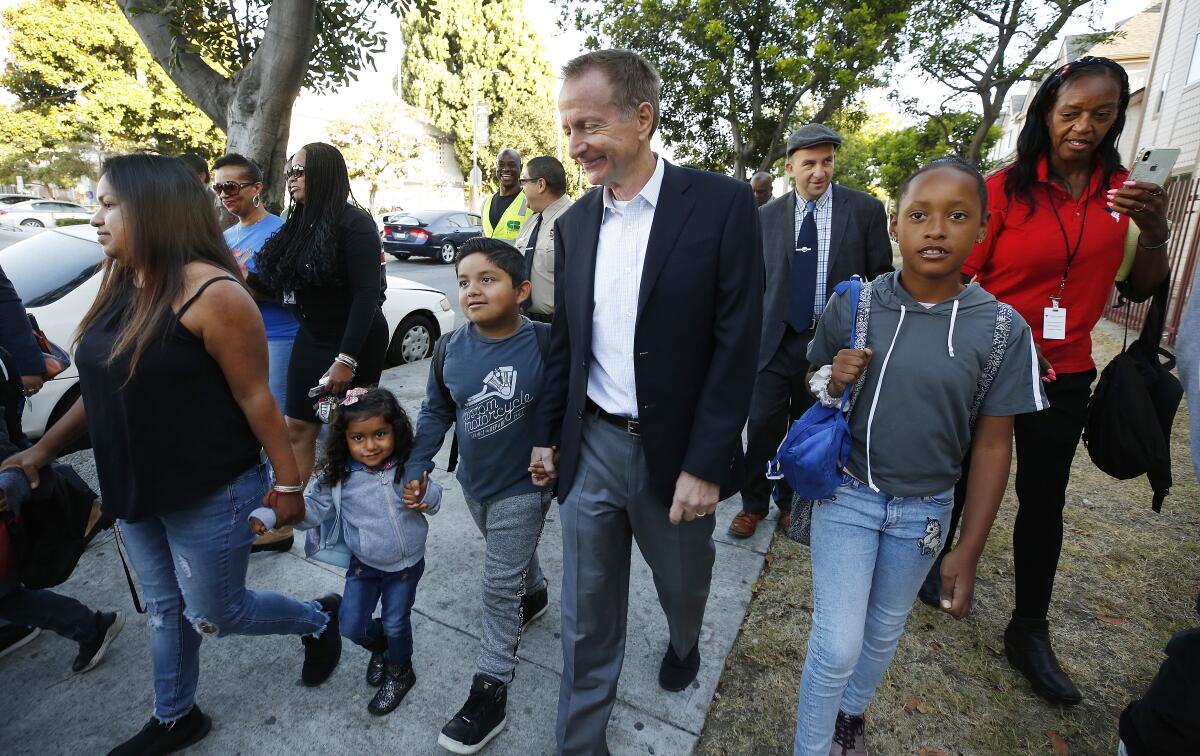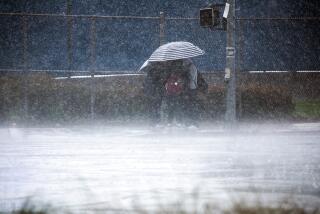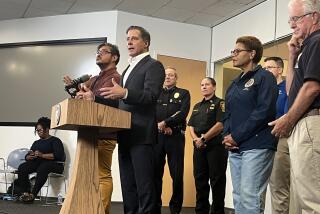L.A. school district declares state of emergency to prepare for coronavirus response

- Share via
The Los Angeles Board of Education on Tuesday declared a state of emergency, giving Supt. Austin Beutner the authority to take actions needed to close schools if necessary in response to the coronavirus outbreak.
The action is seen as a precaution that would allow Beutner to act quickly as the need arises in the nation’s second-largest school district. As of Tuesday night, there were no plans to close schools and no individual diagnosed with COVID-19 had a connection to an L.A. Unified school, according to the district.
“What we’re asking for is emergency authority,” Beutner told the Board of Education before their unanimous vote. “That does not necessarily mean that there will be emergency action today, tomorrow or a week from now. This will allow us to take all appropriate action as the facts and circumstances could change quickly.”
Some schools and school systems, mainly in Northern California, have gone well beyond planning.
After a Catholic school student and a custodian tested positive for COVID-19, the Archdiocese of San Francisco shuttered all 90 of its schools in Marin, San Francisco and San Mateo counties from Wednesday until March 25, the archdiocese announced Tuesday. The Elk Grove Unified district, the largest in Northern California, closed schools for the entire week after an elementary school student was diagnosed with the virus.
One problem, said Beutner, is that there are no standard protocols for when to close a school or specific guidance on how long a school should remain closed.
“We look at the range of alternatives: isolated community, isolated individual, diagnosed to a specific place — that might cause us to take one set of actions,” he said after the meeting.
Then there’s consideration for schools like Hamilton High School: 2,623 students from 94 zip codes — some as far as 30 miles away. And 221 employees from 88 zip codes.
“So we’re planning for different scenarios. We don’t know which one’s going to happen or if any will happen,” Beutner said.
What does an emergency declaration mean?
The declaration gives Beutner the authority to relocate students and staff, revise student transportation arrangements and approve alternative educational options. It also gives him authority to provide paid leaves of absence for employees due to quarantine or illness, assignstaff to serve as disaster-service workers, and order necessary alterations, repairs or improvements to district property.
The declaration also allows Beutner to pay for these measures without going through the usual contracting process.
L.A. Unified is responsible for the education and safety of more than half a million district and charter-school students. If adult education and early education numbers are included, that total rises to more than 670,000. There also are about 78,000 full- and part-time workers.
How would instruction be provided?
The district has been developing contingency plans but has released limited details.
Deputy Supt. Megan Reilly, who is overseeing the response planning, said the district already has two online learning tools that would be expanded. One platform allows students to receive and turn in assignments online. A separate system allows students to take self-contained online courses. That system has been used for students who need to pass courses quickly in order to graduate.
But there are three serious limitations: There aren’t enough devices for students to take home; not all families have internet at home, and many teachers and students are not trained to manage instruction online.
The district has no perfect solution for any of these challenges, but Beutner asked the state on Monday for $50 million to purchase devices. The superintendent also sent letters to all the major internet providers, asking them to supply free emergency broadband access.
Beutner also is asking the state for authority to assign students to independent study outside of the normal, more time-consuming process. And he wants the state to stockpile emergency supplies that schools might need.
How about the hardships faced by families and employees?
Officials in L.A. Unified and other school districts throughout the state understand the hardship that school closures would bring to families, especially in a district such as L.A. Unified, where about four in five students are members of a low-income household, and where both parents work and have limited childcare options.
“We know that those who will be hardest hit in a situation like this are the most vulnerable, whom we serve in a large percentage in our schools,” said school board member Kelly Gonez in an interview.
The campus frequently becomes a locus for medical services and family counseling. And some families also depend on L.A. Unified for food — about 17,000 students are homeless.
“We have a very large number of students who eat breakfast, lunch and dinner at school,” said school board member Jackie Goldberg. “I don’t think we have an answer for that yet. ... Are there ways to distribute food that don’t include passing the virus along with it?”
The federal government has loosened rules to allow students to be fed outside of normal school operations, if a school is closed due to coronavirus. And California Gov. Gavin Newsom also has indicated he will support this goal.
Locations that serve students food in the summer through the Summer Food Service and the Seamless Summer Option can also be approved “to provide meals during unanticipated school closures” at schools and elsewhere, said Margo Minecki, a spokeswoman for the L.A. County Office of Education.
In L.A. County, sites approved for summer meal service include campuses, city parks, churches and local nonprofit centers. To avoid the gathering of groups, families could pick up meals and take them home. More than two-thirds of L.A. County public school students qualify for free or reduced-price meals and about 80% in LAUSD.
The district’s Reilly said employees still would be paid if schools are closed, and that no one should worry about facing repercussions for staying home when they are sick.
“If you are sick we are being very liberal” in allowing for sick time, she said.
More to Read
Sign up for Essential California
The most important California stories and recommendations in your inbox every morning.
You may occasionally receive promotional content from the Los Angeles Times.












